
Local Traditions & Customs in Shenzhen, Guangdong, China
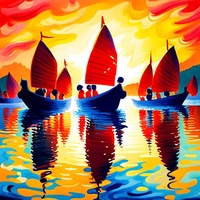
1. Dragon Boat Festival
This festival involves exciting races with long dragon boats on the water. It's a tradition that honors past heroes and encourages teamwork. Travelers can enjoy festive local foods like zongzi, a rice dumpling wrapped in bamboo leaves.
- Timing: Held on the 5th day of the 5th lunar month, usually in June.
- Location: Check local announcements for race locations, often in rivers or large bodies of water.
- Participation: Consider arriving early to secure a good viewing spot.
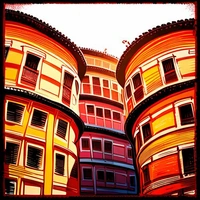
2. Hakka Tulou Villages
These earthen buildings are unique to the Hakka people and reflect communal living and defense strategies. Visiting these villages offers a glimpse into their history and culture, with traditional architecture that can't be found elsewhere in Shenzhen.
- Accessibility: Can be off the main tourist path, requiring a day trip.
- Guided Tours: Useful to understand the historical and cultural significance.
- Photography: Great opportunities for unique architectural shots.
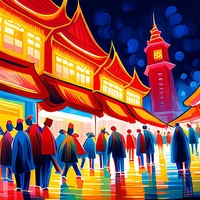
3. Nian Li Market Celebrations
This market bursts to life around the Lunar New Year, offering traditional crafts, foods, and performances. It's an excellent place to experience local commerce and customs.
- Timing: Best visited close to Lunar New Year.
- Crowds: Very busy; be prepared for a lot of people.
- Bargaining: Common practice in markets; polite haggling is expected.
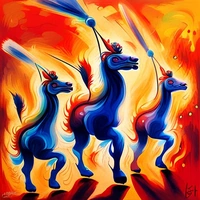
4. Qilin Dance Performance
This traditional dance is unique to various Chinese festivals and brings good fortune. Different from the lion dance, it involves skilled acrobats in colorful qilin costumes.
- Schedule: Check local event calendars for performance dates.
- Interaction: Sometimes involves audience participation or blessing rituals.
- Cultural Etiquette: Respect and understand the spiritual and cultural significance.
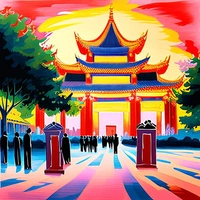
5. Chaozhou Opera in Shenzhen
A traditional art form that is less known than Peking opera and features local dialects, music, and costumes. This opera offers a unique insight into regional art.
- Language Barrier: Mainly performed in regional dialects; translation devices or guides can help.
- Venue: Look for local theaters offering performances.
- Dress Code: Casual but neat, as per local customs.
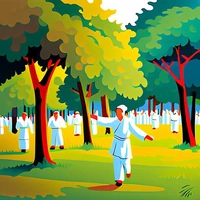
6. Tai Chi Sessions in Parks
Early morning Tai Chi sessions in public parks are a tranquil tradition that promotes health and well-being. Travelers can join locals to learn this gentle martial art.
- Timing: Usually early morning before breakfast.
- Participation Level: Beginners are welcome; it's easy to pick up.
- Atmosphere: Peaceful, ideal for relaxation and observing local life.
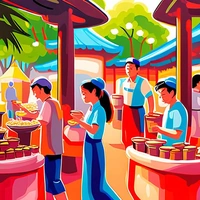
7. Shenzhen Street Food Sampling
Street food is an integral part of local culture, featuring unique snacks like rice rolls and stinky tofu. Sampling street food is essential for understanding local cuisine.
- Hygiene: Choose vendors with clean preparation areas.
- Variety: Be adventurous but ask about ingredients.
- Payment: Cash or mobile payments are usually accepted.
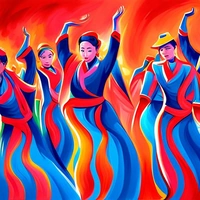
8. Traditional Folk Music Performances
Local musicians often play traditional instruments in public spaces or small venues. This music adds a cultural soundscape to Shenzhen.
- Locations: Often found in parks and local events.
- Schedule: Performances might be spontaneous; keep an ear out.
- Listening: Respect the performers, listen quietly, and show appreciation.
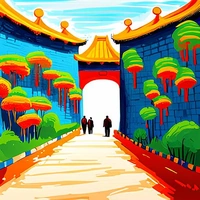
9. Visit to Dapeng Fortress
Originally a military fort, it's now a museum offering insights into past military customs and architecture. The traditional village setting adds to the historic experience.
- Guided Tours: Available to provide historical context.
- Exploration: Wear comfortable shoes for walking around.
- Photography: Abundant unique photo opportunities.
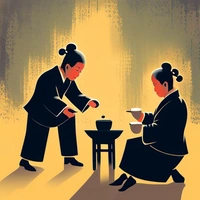
10. Chinese Tea Ceremony
Experience the local tea culture through a traditional tea ceremony, which is a calming ritual reflecting respect and hospitality. It's a chance to taste high-quality teas and learn about their preparation.
- Reservation: May be required for private ceremonies.
- Politeness: Follow the host's lead in the ritual.
- Tasting: Be open to trying different varieties.
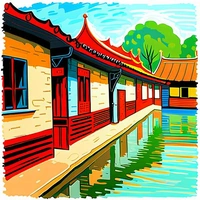
11. Shenzhen Folk Culture Village
This attraction showcases miniature replicas of famous Chinese sites and offers cultural performances. Unique from typical museums, it immerses you in various regional cultures of China.
- Ticketing: Purchase tickets in advance to avoid lines.
- Cultural Shows: Check schedules to catch live performances.
- Interactive Exhibits: Take advantage of hands-on activities.
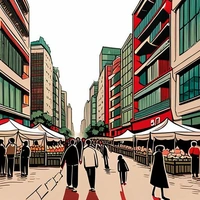
12. Jade Market Exploration
Jade holds cultural significance, symbolizing purity and moral integrity. Markets offer everything from jewelry to carved figures.
- Authentication: Learn to distinguish quality jade.
- Pricing: Expect negotiation and ensure fair pricing.
- Souvenirs: Great spot for purchasing keepsakes or gifts.
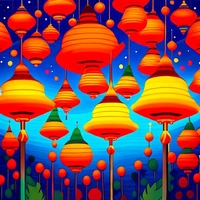
13. Lantern Festival
Lantern festivals are held to mark the end of Lunar New Year celebrations, featuring intricate lantern displays and cultural performances.
- Timing: Falls on the 15th day of the 1st lunar month.
- Evening Event: Most activities occur after sunset.
- Photography: Bring a camera for capturing night-time displays.
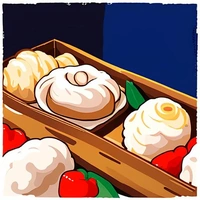
14. Cantonese Dim Sum
Shenzhen offers a particular style of dim sum, reflecting the food culture of the southern region of China. Sharing this meal allows travelers to engage in a communal dining experience.
- Restaurant Selection: Look for busy, popular spots for authenticity.
- Ordering: Dim sum is served in small portions, perfect for sampling various dishes.
- Etiquette: Family-style sharing; use utensils provided.
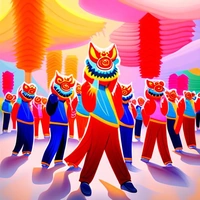
15. Lion Dance at Local Events
This lively and acrobatic dance is performed to ward off evil spirits, often during grand openings or festivals. Its distinct drumming and vibrant costumes make it a must-see.
- Event Timing: Linked with festivals and celebrations.
- Accessibility: Be aware of crowded viewing areas.
- Engagement: Observers may give red envelopes as a token of blessing.
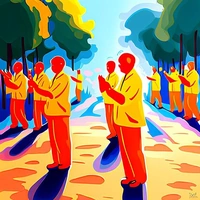
16. Qigong in Lianhuashan Park
Similar to Tai Chi, this practice combines movement, meditation, and breathing, promoting health and spirituality. Classes are often open to public participation.
- Timing: Performances generally occur in the morning.
- Dress: Casual and comfortable clothing recommended.
- Learning: Don't hesitate to ask for guidance from more experienced practitioners.
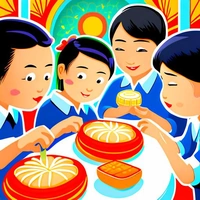
17. Mid-Autumn Festival Mooncake Sampling
Mooncakes are symbolic of reunion and prosperity, enjoyed during the Mid-Autumn Festival. Join locals in sharing these pastries and sipping tea to celebrate.
- Variety: Different flavors cater to diverse tastes.
- Purchasing: Available in stores and bakeries weeks ahead.
- Gifting Tradition: Consider giving mooncakes as a respectful gesture to hosts or friends.
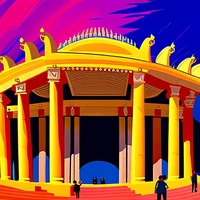
18. Shenzhen Grand Theater Local Plays
Experiencing a local play touches on more than just stories; it explores local humor, history, and values. It contrasts with Western-style performances and offers a unique cultural experience.
- Language: Plays in local dialects or Mandarin; translation may be needed.
- Ticket Booking: Secure in advance for popular shows.
- Dress Code: Considerate dress aligns with etiquette.

19. Traditional Chinese Calligraphy Workshops
Learning calligraphy provides insights into ancient Chinese artistic traditions and deepens cultural understanding. It's a peaceful art form that requires patience and precision.
- Supplies: Materials are typically provided in workshops.
- Instructor: Benefits from guidance to learn proper techniques.
- Practice: Encouraged to continue as a mindful, meditative practice.
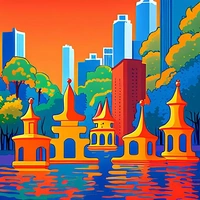
20. Visit to ShenZhen Guanlan Print Base
Explore this artist village known for its traditional printmaking techniques. It offers workshops and houses unique art pieces, distinguishing Shenzhen's local creative scene.
- Workshops: Booking may be required for hands-on sessions.
- Artwork Purchasing: Unique prints are available for purchase.
- Guide Necessity: Helpful to enhance understanding of techniques and history.
